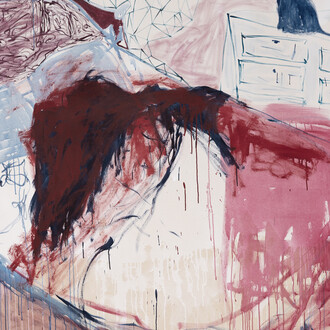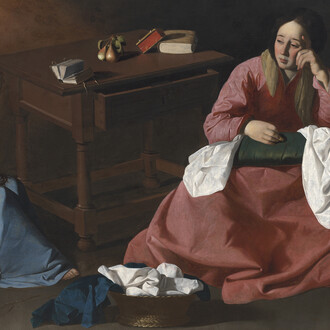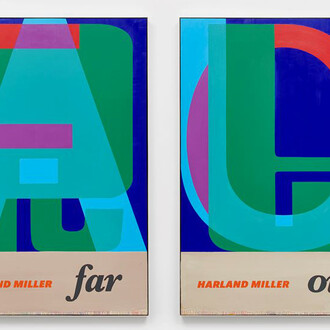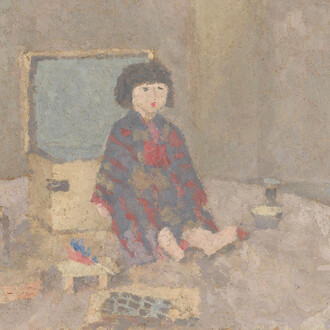White Cube is pleased to present Company, an exhibition of new paintings and works on paper by London-based artist Donna Huddleston. The artist’s first solo exhibition with the gallery, Company ushers in a figurative world of cast and character, in which notions of performativity, temporality and fabulation combine in dramatic tableaux.
Having favoured watercolour and coloured pencil in recent years, Huddleston turns to acrylic paint in this new body of work, while still regarding the medium with a delicate handle and returning to her signature palette of airy, pastel hues. Continuing Huddleston’s longstanding fascination with theatrical gesture and evocation, ‘Company’ is populated by a revolving cast who grace myriad otherworldly settings. Having studied and worked in theatre design before embarking on painting, a sense of the scenographic pervades the artist’s thinking and image-making, while also informing its themes and subject matter. Recital (2024), for instance, presents a troupe of figures, all of whom are recognisable from Huddleston’s eight-part drawing The exhausted student (2019), an earlier work based on her memories of drama school.
The paintings feature solitary figures set flatly against pale, empty grounds. As if brought into the spotlight for our surveyal or scrutiny from a performance out of view, they appear strong and contemplative though, much like their composition, self-contained. While choices of character posture, clothing and palette are important features of each painting, Huddleston’s ‘company’ feels distinctly atemporal, wherein loners from an unspecified era have been outfitted for the pose. In the painting Gentleman caller (2024), for example, Huddleston references a character from Tennessee Williams’ 1944 The glass menagerie, a loosely autobiographical play. The "Caller" in Huddleston’s painting is a voguish, androgyne dandy in a pistachio green suit, broad-brimmed Stetson and olive-green heels. Re-casting her ‘company’ in different character roles, the figure from Gentleman Caller re-appears, instead clad in red, in the large-scale painting Patagonia (2024) elsewhere in the exhibition.
In addition to theatre, Huddleston draws upon cinema and the traditions of classical painting: ‘The references can be anything really, from film stills to architectural and interior details, animals, artworks, actors […] It’s about texture, feeling, light, a look. Nothing is off limits, there’s no hierarchy’. For Company, however, the artist was particularly inspired by Éric Rohmer’s Perceval le Gallois (Perceval the Welshman), a 1978 filmic rendition of a 12th-century Arthurian narrative, as well as the finery and hairstyling of medieval and Tudor portraiture. Nodding to the range of influences, a medieval-styled female figure is seen to inhabit Night vision (2024), who hovers in front of an arched fenestration modelled upon an architectural feature of the Brutalist, St. Peter’s Seminary in Scotland. Similarly, Hanna (2024) features two versions of actress Hanna Schygulla, known for her leading roles in the work of Rainer Werner Fassbinder: one dressed in medieval regalia, the other as a corseted ’80s vamp.
Equally enigmatic, the young girl in Sylvia’s mother (2024) is dressed in unmistakably ’70s style, with red flares and a hand-knitted, jacquard sweater, much like one the artist’s mother made for her when she was a child. Placid yet assertive, the girl holds out a fig branch on which a fruit bat balances, wings outspread. Towering behind her is a female nude, a blue-toned monument to motherhood that Huddleston has based on the actress Gena Rowlands, wife and muse of the director John Cassavetes, and to whose 1984 film Love streams the protagonist belongs.
Dramatic tension and ritualised pose come to bear in large-scale paintings that depict characters in classical arrangement in a proscenium-like setting. Pointing to the psychology of performance and its role on the stage and in everyday life, these works engage both the tropes of traditional portraiture and the techniques of theatrical design. ‘There’s very much a performative aspect for me, in creating the figures in the drawing’, the artist has said.
A suite of coloured pencil works in Company highlights the ongoing importance of the medium to Huddleston’s artistic practice. Inspired by the impressions of light and colour from memories of her childhood in Australia, Huddleston’s use of coloured pencil has informed both a formal precision and delicate palette that extends to her paintings. In these works on paper, heroines from another generation abut with contemporary figures, including Huddleston’s friend and fellow artist Kira Freije (Kira, 2023) and American writer and feminist, Lynne Tillman (Lynne, 2023). ‘Memory plays a huge part but it’s about what this becomes in the now’, the artist has said. ‘It’s more of a feeling I’m after, and I use whatever works: past, present, future’.
















